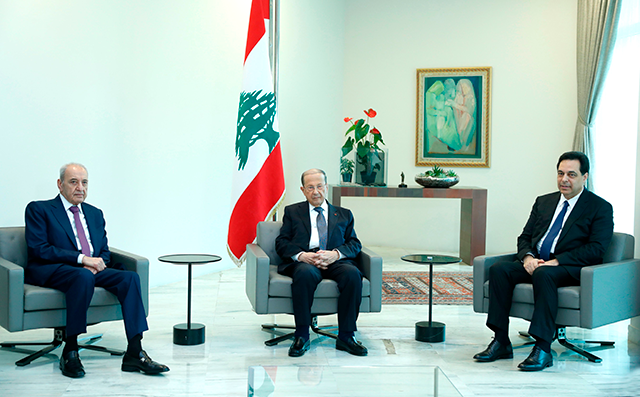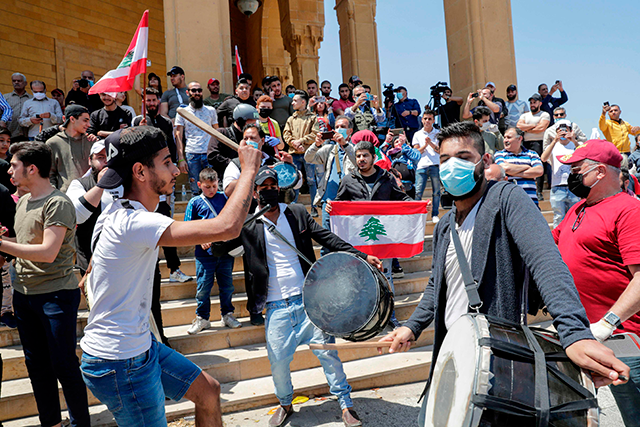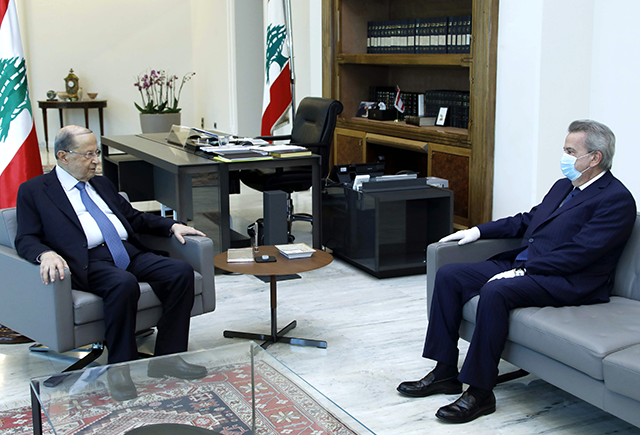You are here
IMF rescue 'mandatory' for Lebanon recovery — president
By AFP - May 06,2020 - Last updated at May 06,2020

Left to right: Lebanon's Parliament Speaker Nabih Berri, President Michel Aoun, and Prime Minister Hassan Diab meeting together at the presidential palace in Baabda, east of Beirut, on May 6. (AFP photo)
BEIRUT — Lebanese President Michel Aoun said on Wednesday that financial assistance from the International Monetary Fund (IMF) was "mandatory" for an economic recovery, as the country sinks deeper into financial turmoil.
Lebanon is in the thick of its worst economic crisis since the 1975-1990 civil war, compounded by the coronavirus epidemic.
Forty-five per cent of Lebanon's population now lives below the poverty line, and tens of thousands of people have lost their jobs or seen their salaries slashed as a result of the downturn.
Aoun on Wednesday met with most heads of the country's main parliamentary blocs to discuss the broad outlines of an economic reform plan that the government adopted last week but parts of which still require parliamentary support.
The economic roadmap comes with a government request for IMF assistance, which Aoun called "a mandatory path for recovery if we negotiate well and we are all fully committed to... reform".
Parliament speaker Nabih Berri and Samir Geagea, head of the Lebanese Forces, a Christian political party, were among the attendees.
But political heavyweights such as former prime minister Saad Hariri boycotted the session over objections to the current government's approach to the economic crisis.
Aoun said the rescue plan was not the responsibility of a single group or party.
"Getting out of the dark tunnel that we are crossing is everybody's responsibility," he said.
This reform plan, the president said, "aims at correcting the structural imbalances" of a free falling economy, but its success requires "sacrifices"
The roadmap -- long seen as a prerequisite for external financial aid -- aims to reduce Lebanon's enormous public debt burden from 170 per cent of GDP to less than 100 per cent.
It calls for a restructuring of the banking sector and the country's enormous debt pile, as a well as tax hikes and a freeze in state hiring, among a raft of other reforms.
It comes against the backdrop of a series of economic woes, which include a dollar liquidity crunch, soaring inflation, the country's first sovereign debt default and a devaluation of the Lebanese pound.
The pound has been selling for more than 4,000 to the dollar on the black market in recent weeks in a record low.
Although the official exchange rate remains fixed at 1,500 to the dollar, the government's reform plan is based on an exchange rate of 3,500 to the greenback.
"What we are offering is not a sacred text, it can be developed" further, Prime Minister Hassan Diab said at the meeting.
"We are presenting this plan to you because it is not the property of the government," he said. "It is a work programme for the state."
Related Articles
BEIRUT — Lebanon on Friday signed a request for financial help from the International Monetary Fund (IMF), initiating a long process the gov
BEIRUT — Lebanon has arrested the head of the money exchange union as it battles to stabilise the value of the country's nose-diving currenc
BEIRUT — Prime Minister Hassan Diab said on Friday that Lebanese bank deposits have plunged $5.7 billion in the first two months of the year



















